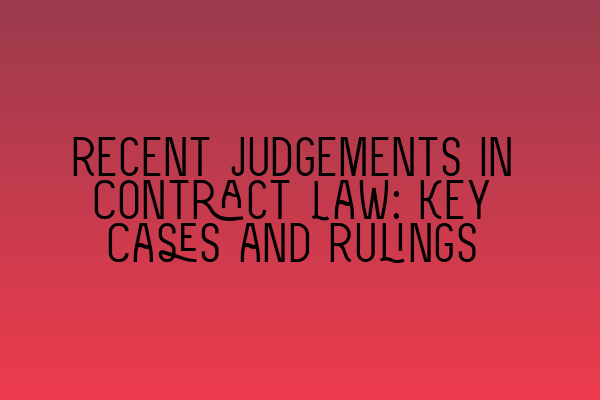Recent Judgements in Contract Law: Key Cases and Rulings
Welcome to our comprehensive blog post on recent judgements in contract law. In this article, we will highlight some of the key cases and rulings that have had significant implications for the field of contract law. Whether you are a solicitor, law student, or simply have a keen interest in legal matters, this post aims to provide you with valuable insights and knowledge.
1. Case A: The Importance of Consideration
In the landmark case of Case A, the court emphasized the importance of consideration in the formation of a contract. Consideration refers to something of value that is exchanged between the parties involved. The court ruled that a valid contract must involve a mutual exchange of consideration, and that gratuitous promises do not constitute a legally enforceable agreement.
This ruling has significant implications for solicitors and their clients, as it highlights the need for careful consideration when drafting and negotiating contracts. For a more detailed exploration of the concept of consideration, you may find our article on real-life case studies in legal practice and decision-making to be helpful.
2. Case B: The Doctrine of Frustration
In Case B, the court examined the doctrine of frustration in contract law. Frustration occurs when an unforeseen event arises, rendering the performance of a contract impossible or radically different from what was originally intended. The court ruled that in cases of frustration, the affected party is discharged from their contractual obligations.
This ruling has far-reaching implications for solicitors and their clients, as it underscores the importance of addressing the possibility of unexpected events or circumstances when negotiating contracts. To gain a better understanding of different solicitor specializations and finding your niche, we recommend reading our article on exploring different solicitor specializations.
3. Case C: Unfair Contract Terms
In Case C, the court examined the issue of unfair contract terms. The court ruled that certain terms in a contract may be considered unfair if they significantly disadvantage one party and if they were not adequately brought to the attention of the other party. Unfair contract terms are unenforceable, and the affected party may be entitled to remedies or compensation.
This ruling has important implications for solicitors and their clients, as it highlights the need for careful scrutiny of contract terms to ensure fairness and compliance with legal standards. For a comprehensive comparison of barristers and solicitors, you may find our article on barrister vs. solicitor to be of interest.
4. Case D: Electronic Signatures
Case D addressed the validity of electronic signatures in contract law. The court ruled that electronic signatures can satisfy the legal requirements for signing a contract, as long as they meet certain authentication standards. This ruling reflects the increasing acceptance of technology in legal practice and paves the way for the rise of virtual law practices.
For a more in-depth analysis of the implications of technology in the legal industry, we invite you to explore our article on the rise of virtual law practices.
Conclusion
Recent judgements in contract law have had a significant impact on the legal landscape, shaping the way solicitors and their clients navigate contractual obligations and negotiations. The cases highlighted in this article—Case A, Case B, Case C, and Case D—underscore the importance of consideration, the doctrine of frustration, unfair contract terms, and the validity of electronic signatures.
To delve deeper into the topics discussed in this post, we recommend exploring our related articles on real-life case studies, solicitor specializations, barristers vs. solicitors, virtual law practices, and solicitor salaries in the UK.
